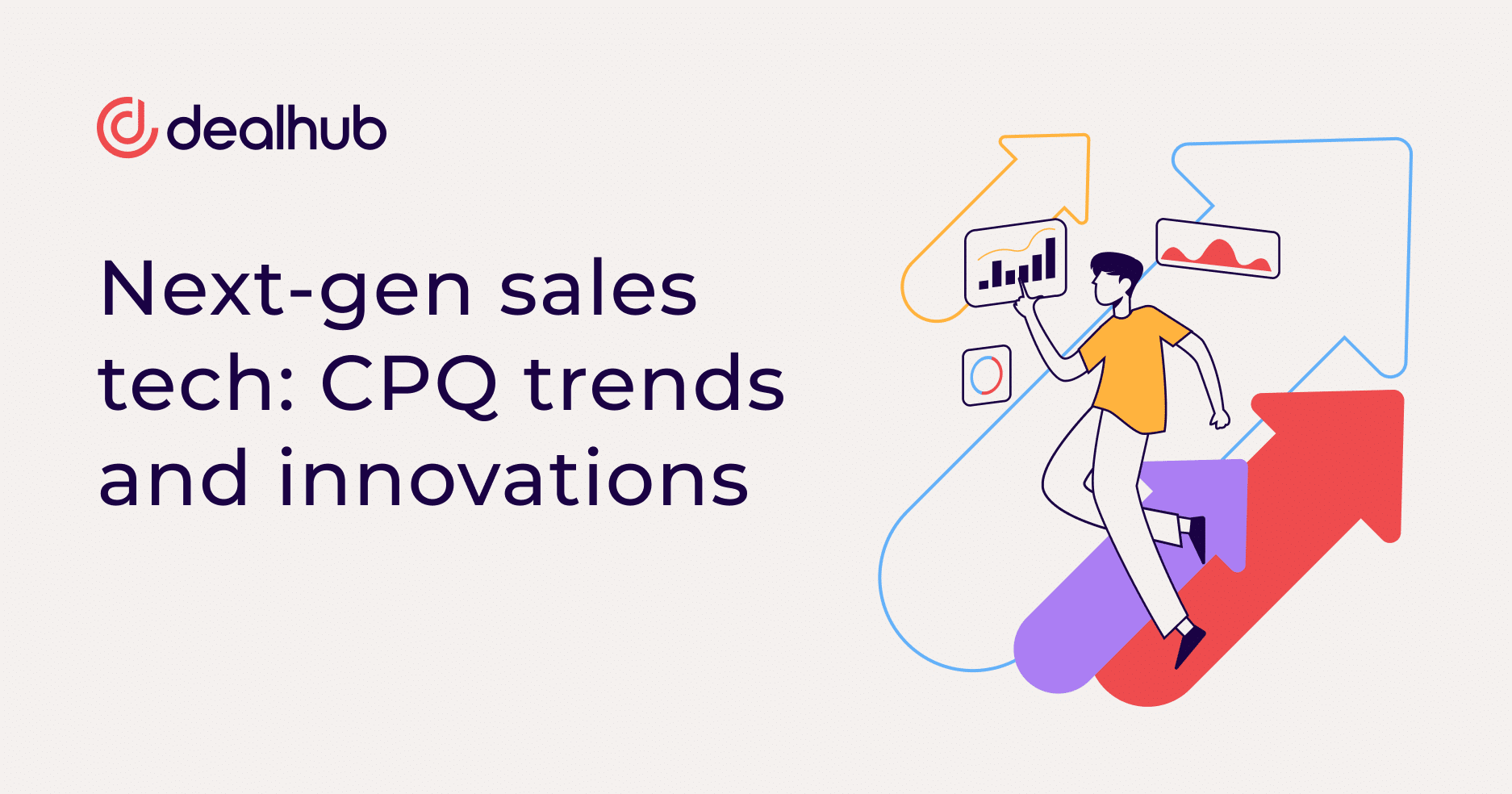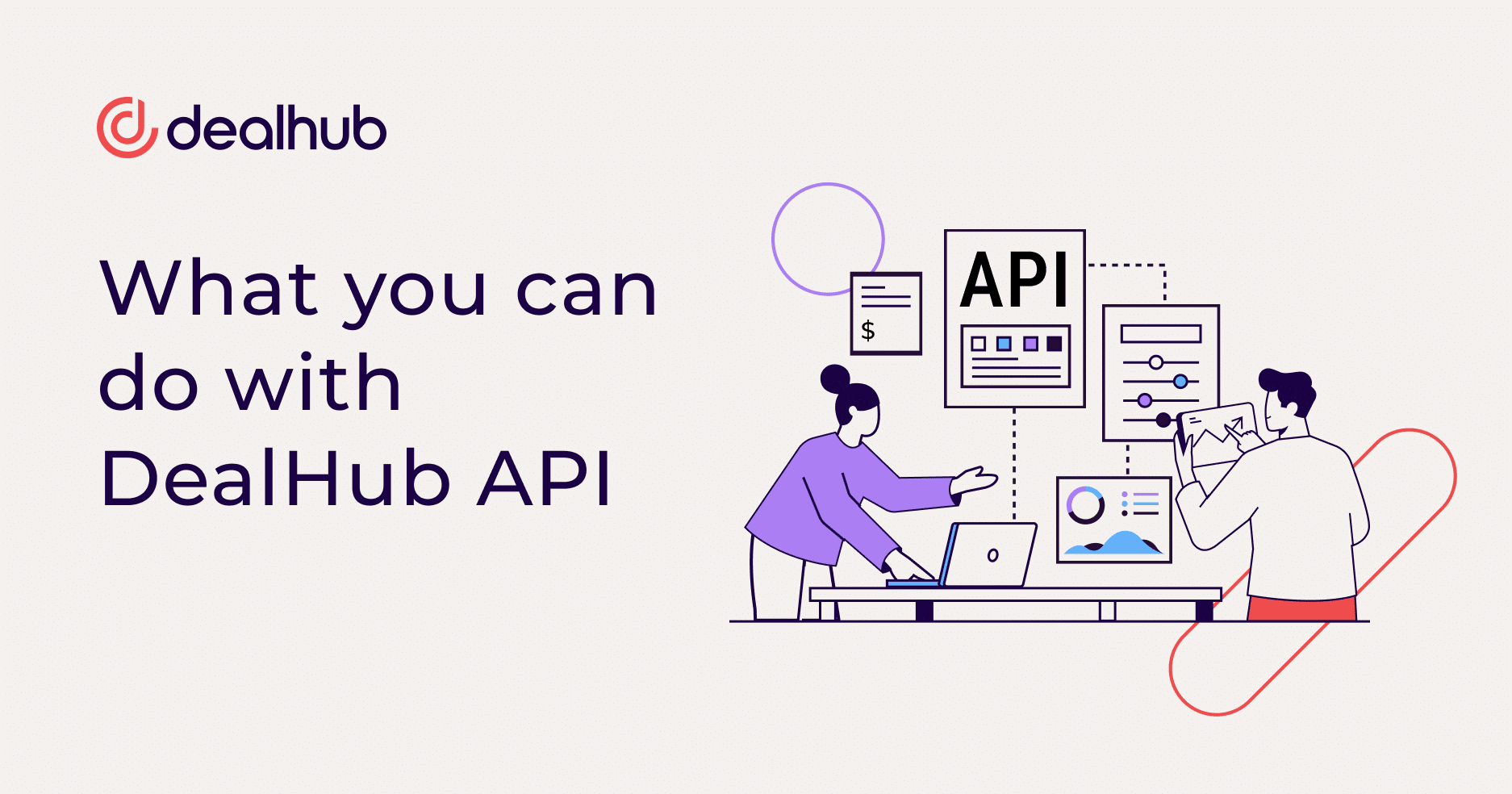And the CPQ software industry isn’t just growing – it’s shooting for the stars! Experts predict that the market for this software will grow from $2.2 billion to $7.3 billion by just 2030. This jump is a big deal because it shows how valuable businesses find these tools to make sales smoother and more successful.
In simple terms, CPQ software is a must-have in the sales toolkit. It’s about technology but more importantly, it’s about making sales more accessible, faster, and more customer-friendly. Read on to learn the cool new trends and innovations in CPQ software and how they’re reshaping sales.
7 CPQ trends and innovations to keep on your radar

From machine learning enhancing product configurations and pricing strategies to cloud-based systems offering flexibility and security, CPQ is rapidly changing the world of sales. Let’s explore these transformative trends.
- Machine learning
Machine learning is a subset of artificial intelligence that is playing an important role in improving CPQ software. Through the use of machine learning algorithms, CPQ systems are becoming more intelligent and able to handle complex sales scenarios with greater efficiency and accuracy.
Smart product configuration: One of the primary challenges in the sales process is ensuring that the product configuration proposed to a customer is valid and optimal, especially when dealing with customizable products with complex pricing structures. Machine learning takes action by analyzing vast amounts of data to detect and resolve product configuration conflicts. It handles complex pricing models adeptly, ensuring that the proposed configuration aligns with both the customer’s budget and the company’s pricing strategy. For example, it can identify incompatible features or suggest alternatives that best match customer preferences or requirements. This capability significantly reduces the risk of errors in the quoting process and improves the overall customer experience by offering tailor-made solutions.
Automated pricing and discounting: Traditionally, sales teams would spend considerable time analyzing market trends and customer data to develop competitive quotes. Machine learning revolutionizes this aspect by employing algorithmic models that can quickly process current market data, customer purchase history, and profiles to suggest the most competitive and personalized pricing and discounting strategies. This saves time and ensures that quotes are market-relevant and personalized, increasing the chances of closing deals.
Predictive insights: One of the most transformative roles of machine learning in CPQ is its ability to offer predictive insights. Machine learning algorithms utilize historical data to predict customer needs and preferences, allowing sales teams to provide proactive and relevant recommendations. This foresight enhances the seller experience by simplifying decision-making and delights customers with tailored offerings that align with their past behaviors and predicted future needs.
- Cloud-based solutions
The trend toward cloud-based CPQ solutions is rapidly gaining momentum in sales. These solutions offer a multitude of benefits, from scalability and easy integration to remote sales enablement and enhanced data security, making them a compelling choice for modern sales teams aiming to stay agile and competitive.
Increased adoption: One of the key drivers behind the increased adoption of cloud-based CPQ software is its scalability. Cloud-based CPQ software, like DealHub, offers scalability that can easily adjust to a business’s changing needs, making them suitable for companies of all sizes, unlike traditional on-premise solutions. This flexibility is necessary in today’s market, where demand can fluctuate unexpectedly. Additionally, cloud-based CPQ solutions offer the advantage of seamless integration with other cloud services. This interoperability simplifies the integration process with CRM systems, ERP solutions, and other essential sales tools, creating a more cohesive and efficient sales ecosystem.
Remote sales enablement: The rise of remote work has made cloud-based CPQ tools more relevant than ever. These solutions empower sales teams to collaborate effectively, regardless of their physical location. By providing remote access to essential sales tools and data, cloud-based CPQ ensures that sales professionals can prepare accurate quotes, respond to customer inquiries, and finalize deals from anywhere. This flexibility is further enhanced by digital sales room technologies like DealRoom, which brings B2B buyers and sellers together in a digital sales environment. DealRoom’s personalized approach for each buyer, combined with its real-time communication and notifications about buyer engagement enhances team productivity and ensures that the customer experience remains consistent and high-quality, irrespective of geographical constraints.
Enhanced data security and compliance: Another significant advantage of cloud-based CPQ solutions is their heightened data security and compliance level. Cloud providers prioritize security by making significant investments in measures such as regular updates and patches to protect against cyber threats. Businesses using cloud-based CPQ can benefit from advanced security protocols that might be challenging to implement in-house. Furthermore, these solutions often have compliance certifications, ensuring data handling meets the latest legal and industry standards. This aspect is particularly influential for companies dealing with sensitive customer data, where compliance and data protection are paramount.
- Self-service capabilities
CPQ software’s self-service capabilities are revolutionizing how customers interact with sales processes, offering autonomy and efficiency that significantly enhance the customer experience.
Customer-facing portals: One of the most impactful features is the introduction of customer-facing portals. These platforms empower customers to manage configurations and orders independently. This independence is not just about convenience; it’s about giving customers control over their purchasing decisions. They can customize products or services to their specific needs, check pricing options, and even see real-time updates on their orders. This level of engagement streamlines the sales cycle and increases customer satisfaction by making them active participants in the buying process.
Automated approvals: Another critical aspect is the automation of approval workflows within CPQ software. Traditionally, the approval process for quotes or configurations could be time-consuming, involving multiple levels of manual checks. With automated workflows, this process is expedited significantly. For example, DealHub can pre-define approval hierarchies and rules, allowing immediate responses to standard requests and faster turnaround for customized or complex quotes. This speed in the approval process translates to quicker sales cycles and a more dynamic response to market demands.
Improved user experience: Lastly, the success of self-service capabilities relies on an outstanding user experience. CPQ software developers have focused on designing intuitive interfaces to simplify the process for customers to navigate, configure, and purchase products or services. An intuitive interface makes the software easier to learn and use, expanding its appeal to a wider customer base. This approach simplifies the process for end-users and lowers the burden on sales teams, as customers can independently handle a significant portion of the buying process.
- Enhanced risk management
Enhanced risk management is becoming an indispensable component in CPQ software, as it ensures that sales processes remain efficient, compliant, and secure.
Compliance checks: In an environment where regulatory requirements constantly evolve, real-time validations for regulatory compliance in CPQ software are paramount. These compliance checks ensure that every quote or contract meets the current legal standards, protecting the company from potential legal risks. For instance, CPQ software can automatically verify tax rates, regional pricing laws, and industry-specific regulations, ensuring that all quotes are compliant. This feature is invaluable for businesses operating in multiple jurisdictions or sectors with stringent regulatory requirements.
Contract risk assessment: Another vital aspect of CPQ software risk management is the contract risk assessment. Advanced CPQ tools come equipped with functionalities that can identify potential contract risks, such as unfavorable terms, pricing errors, or non-compliance with company policies. By flagging these issues early in the quoting process, CPQ software helps mitigate risks before the contract is finalized, safeguarding the company against future disputes or revenue losses.
Improved auditability: Finally, enhanced risk management in CPQ also means improved auditability. The software creates transparent audit trails for every quote and contract, detailing who made what changes and when. This transparency is crucial for maintaining data integrity and compliance, as it provides a clear and accessible record for internal audits or regulatory reviews. Audit trails in CPQ software are pivotal in ensuring accountability and traceability within the sales process, reinforcing overall risk management strategies.
- Integration with other systems
CPQ software’s ability to integrate with various business systems is a keystone of its utility, streamlining the sales process across different platforms.
B2B eCommerce platforms: Integrating CPQ software with B2B eCommerce platforms is a game-changer for online ordering. This seamless integration allows for the automation of the ordering process, where customers can configure and order products directly through an eCommerce interface. The benefit here is two-fold: customers enjoy a more streamlined and user-friendly purchasing experience, while businesses benefit from the efficient processing of orders, reduced errors, and a faster sales cycle.
ERP and CRM systems: Integrating CPQ software with ERP and CRM systems significantly reduces manual data entry, thus enhancing accuracy. This integration ensures that information flows smoothly between sales quotes and business operations. The data entered into the CPQ system can automatically update customer records in the CRM and align with the ERP system for inventory management and financial reporting. This cohesion eliminates data silos, reduces the chances of errors, and ensures a consistent flow of information.
Marketing automation tools: When CPQ software is integrated with marketing automation tools, it dramatically enhances the customer journey. This integration enables the delivery of personalized recommendations to customers based on their interactions and preferences, as recorded in the CPQ system. By aligning sales data with marketing strategies, businesses can create more targeted, relevant, and effective marketing campaigns that resonate with their customer’s needs and preferences.
Billing: Integrating CPQ with billing systems offers several benefits that streamline the quote-to-cash (QTC) process and improve overall business efficiency. When data flows seamlessly between CPQ and billing, it eliminates manual entry and reduces invoicing errors. Accurate pricing and automatic invoice generation improve revenue capture and reduce leakage.
- Purpose-built product content and market intelligence
Dynamic content and market intelligence are pivotal in modern CPQ systems, significantly enhancing their effectiveness and relevance.
Dynamic product catalogs: Dynamic product catalogs ensure that sales reps and customers can always access the latest product offerings, specifications, and prices. This real-time updating eliminates the possibility of outdated or incorrect product information, which can lead to errors in the sales process and diminish customer trust. Dynamic catalogs respond rapidly to changes in inventory, product developments, or pricing adjustments, ensuring that the sales process remains accurate and efficient.
Data-driven insights: Market intelligence within CPQ systems plays a crucial role in informing pricing strategies and other strategic decisions. By analyzing data trends, market conditions, and customer behavior, CPQ systems can provide valuable insights that guide pricing strategies. This intelligence enables sales teams to set competitive prices that reflect current market dynamics and customer expectations, enhancing the potential for successful deals.
Improved product knowledge: Integrating market intelligence and dynamic content into CPQ systems empowers sales representatives with a deeper understanding of the products they are selling. With access to the latest product information and market insights, sales reps can offer customers more informed and relevant recommendations. This knowledge not only boosts the sales team’s confidence but also enhances the customer’s trust in the sales process, as they receive recommendations that are accurate and tailored to current market realities.
- No-code solutions
Agile no-code CPQ solutions represent a significant shift in how businesses implement and manage their sales processes, offering a range of benefits that enhance efficiency and flexibility.
Faster implementation: One of the standout advantages of no-code CPQ software is the speed of deployment. Traditional CPQ systems often require extensive customization, which can be time-consuming and complex. No-code platforms like DealHub, on the other hand, are designed for rapid deployment. Their user-friendly interfaces allow for quick and easy setup, drastically reducing the time it takes to get the CPQ system up and running. This swift implementation means businesses can benefit from the CPQ system’s efficiencies without a lengthy or disruptive integration period.
Scalability: As businesses grow and evolve, their CPQ needs may change. No-code CPQ solutions excel in their ability to accommodate this growth. These platforms are inherently designed to be scalable, allowing businesses to easily add or modify features as their requirements evolve. This scalability ensures that the CPQ system remains aligned with the business’s needs, regardless of how it grows or changes over time.
Reduced IT dependency: Another significant benefit of no-code CPQ is the decreased need for extensive IT involvement. The user-friendly nature of no-code platforms means that non-technical staff can often make adjustments and updates without needing specialized IT skills. This system management democratization speeds up changes and reduces the strain on IT resources, allowing them to focus on other critical areas.
Flexibility and agility: The adaptability of no-code CPQ solutions to changing business needs is a decisive advantage. These systems are designed to be flexible, enabling businesses to quickly and easily adapt to new market conditions, customer requirements, or business strategies. This agility ensures that the CPQ system can continually support the business effectively, even in rapidly changing environments.
Your future is brighter with CPQ
Advancements in CPQ technology are significantly transforming sales processes by equipping teams with tools that not only streamline selling but also evolve for higher efficacy. These intelligent systems are shaping a future where deep insights into customer preferences and pricing structures inform sales strategies.
DealHub is at the forefront of this technology, and we aim to bring innovative solutions to the sales world in real time. Our platform uses machine learning to make product pricing and configuration smarter and easier to use. It’s a cloud-based solution, meaning it’s flexible, easy to scale up, and supports sales teams working remotely.
We also focus on making things straightforward for our users. Our self-service features mean customers and sales teams can handle things independently, using interfaces that are simple to navigate. Safety and compliance are our top priorities, so we’ve built robust risk management into our CPQ solutions to keep your data secure.
What distinguishes DealHub CPQ is how well it integrates with different business systems, like ERP, CRM, and billing platforms. Our quote and pricing APIs enable DealHub to fetch data from other sources and bring it into the CPQ to 100% accurate quoting, every time. Our no-code solution allows quick implementation and less reliance on IT teams, keeping you agile and ready for whatever the market brings.
For Sales Operations and Revenue Operations leaders, partnering with DealHub for advanced CPQ technology is a strategic decision that can significantly transform your sales process. Our cutting-edge CPQ solutions bring speed, intelligence, and customer-centricity to your sales strategies, and by choosing DealHub, you’re not just upgrading your tools; you’re elevating your entire sales approach to a new level of sophistication and effectiveness.








